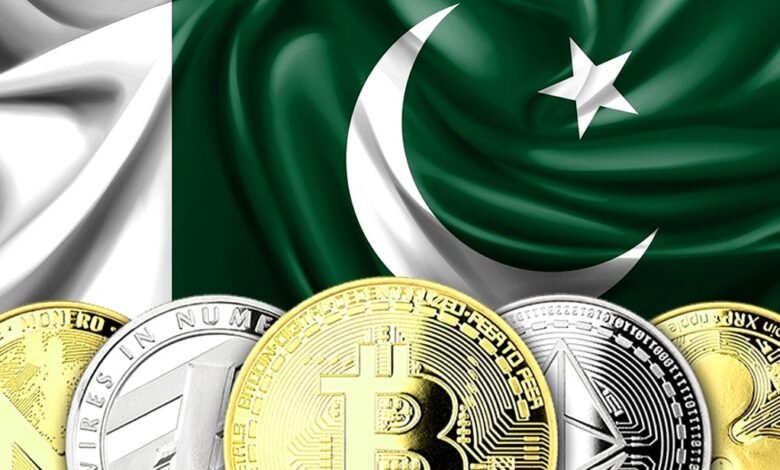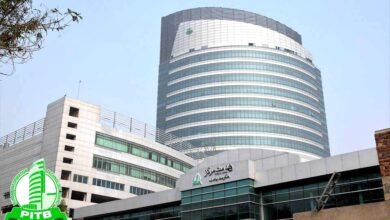Blockchain Adoption in Pakistan: Use Cases Beyond Crypto
Discover how Pakistan is leveraging blockchain technology beyond cryptocurrency in healthcare, supply chain, governance, and finance for digital transformation.

Blockchain adoption in Pakistan is rapidly expanding beyond the traditional cryptocurrency narrative, with the technology finding innovative applications across multiple sectors of the economy. While the world initially knew blockchain primarily as the foundation for Bitcoin and other digital currencies, Pakistan’s tech-savvy population and progressive government initiatives are demonstrating the transformative potential of distributed ledger technology in solving real-world problems.
The launch of the Pakistan Crypto Council (PCC) in March 2025 and the enactment of the Virtual Assets Act 2025 mark decisive moments in the country’s digital transformation journey. With over 60% of Pakistan’s 240 million people under 30, the nation possesses a tech-savvy youth demographic perfectly positioned to drive blockchain innovation. From securing pharmaceutical supply chains to digitizing government services, blockchain technology in Pakistan is creating new opportunities for transparency, efficiency, and financial inclusion.
This comprehensive exploration examines how Pakistani organizations, startups, and government entities are implementing blockchain solutions across healthcare, supply chain management, digital identity, education, and governance sectors, positioning the country as an emerging hub for blockchain applications in South Asia.
Current State of Blockchain Technology in Pakistan
Government Initiatives and Regulatory Framework
The Pakistani government has taken significant steps to establish a comprehensive blockchain regulatory framework. President Dr. Arif Alvi’s advocacy for developing a National Blockchain Strategy in 2022 set the foundation for systematic adoption across sectors. The Ministry of IT and Telecommunication (MoITT) announced plans to formulate Pakistan’s National Blockchain Policy, which serves as a defining element in accelerating blockchain technology innovation throughout the country.
The recently enacted Virtual Assets Act 2025 creates the Pakistan Virtual Asset Regulatory Authority (PVARA), establishing the first comprehensive regulatory framework for blockchain-based businesses. This landmark legislation demonstrates Pakistan’s commitment to balancing innovation with security, ensuring compliance with international anti-money laundering standards while fostering technological growth.
Educational and Research Initiatives
The Presidential Initiative for Artificial Intelligence & Computing (PIAIC), launched in December 2021, serves as an interdisciplinary hub for education and research in blockchain technology. PIAIC offers specialized one-year blockchain programs designed to prepare a skilled talent pool for the emerging digital economy. Additionally, the Pakistan Blockchain Institute provides crucial research, education, and consultation services, contributing to the country’s growing expertise in distributed ledger technologies.
Healthcare Revolution Through Blockchain
Securing Medical Records and Patient Data
Blockchain applications in Pakistani healthcare are addressing critical challenges in medical data management and patient privacy. The technology’s immutable nature ensures that patient records remain secure and unalterable, while providing authorized healthcare professionals with instant access to comprehensive medical histories.
Pakistani hospitals and healthcare providers are piloting blockchain-based health information systems that enable:
- Secure patient data sharing across multiple healthcare facilities
- Instant medical record access during emergencies
- Reduced medical errors through comprehensive patient history availability
- Enhanced patient privacy through encrypted, decentralized storage
Combating Counterfeit Pharmaceuticals
Pakistan’s pharmaceutical industry faces significant challenges from counterfeit medications, particularly affecting low and middle-income populations. Blockchain supply chain solutions are being implemented to create transparent, traceable drug distribution networks from manufacturers to end consumers.
The technology enables pharmaceutical companies to:
- Track medications throughout the entire supply chain management process
- Verify drug authenticity using tamper-proof digital certificates
- Eliminate counterfeit products through transparent provenance tracking
- Enable rapid product recalls when safety issues arise
Research conducted by Pakistani institutions demonstrates that blockchain-based pharmaceutical tracking can significantly reduce the estimated 30% counterfeit drug rate in developing markets, potentially saving thousands of lives while reducing healthcare costs.
Transforming Supply Chain Management
Agricultural Supply Chains
Pakistan’s agricultural sector, employing nearly 40% of the workforce, is leveraging blockchain technology to create transparent, efficient supply chains that connect rural farmers directly with urban markets. These solutions eliminate intermediaries, reduce transaction costs, and ensure fair pricing for agricultural products.
Blockchain applications in agriculture include:
- Digital identity creation for crop batches with quality and ownership verification
- Smart contract implementation for automated payments upon delivery
- Transparency mechanisms that track products from farm to consumer
- Reduced fraud through immutable transaction records
Manufacturing and Industrial Applications
Pakistani manufacturing companies are adopting blockchain solutions to optimize industrial supply chains, particularly in textiles, automotive, and electronics sectors. The technology provides end-to-end visibility, reduces paperwork, and enhances collaboration between suppliers, manufacturers, and distributors.
Leading Pakistani companies like Systems Limited, Cubix, and Netsol are developing enterprise blockchain solutions that streamline manufacturing processes while ensuring product authenticity and regulatory compliance.
Financial Services Innovation
Cross-Border Remittances
Pakistan receives approximately $31 billion annually in remittances from overseas workers, making it one of the world’s largest recipients of international money transfers. Blockchain-based remittance solutions are revolutionizing this critical economic sector by reducing transaction costs and processing times.
The State Bank of Pakistan has launched the Pakistan Remittance Initiative (PRI), a blockchain-based platform for cross-border payments that provides:
- Faster transaction processing compared to traditional banking systems
- Reduced transfer costs by eliminating correspondent bank fees
- Enhanced transparency through real-time transaction tracking
- Improved financial inclusion for unbanked populations
Decentralized Finance (DeFi) and Digital Banking
Pakistani fintech companies are exploring decentralized finance applications that align with Islamic banking principles. These solutions provide unbanked populations with access to essential financial services while maintaining compliance with Sharia law requirements.
Telenor Microfinance Bank’s collaboration with Valyou Malaysia demonstrates successful implementation of blockchain-based financial services, while Faysal Bank’s adoption of blockchain technology for cross-border payments showcases the banking sector’s growing confidence in distributed ledger solutions.
Digital Identity and Governance
E-Governance Applications
Blockchain technology in government services is transforming public administration by creating transparent, efficient, and corruption-resistant systems. Pakistani government agencies are piloting blockchain solutions for:
- Digital identity management in partnership with NADRA
- Land registry systems that prevent property fraud
- Tax collection optimization through transparent financial tracking
- Public procurement processes with enhanced accountability
Voting Systems and Electoral Integrity
Pakistan is exploring blockchain-based voting systems to ensure election integrity and increase voter accessibility, particularly for overseas Pakistani citizens. These systems provide:
- Tamper-proof vote recording through immutable blockchain ledgers
- Transparent vote counting with real-time result verification
- Enhanced accessibility for remote and overseas voters
- Reduced electoral fraud through cryptographic security
Educational Sector Transformation
Credential Verification
Pakistani educational institutions are implementing blockchain-based credential verification systems to prevent degree fraud and streamline employment processes. The Punjab Information Technology Board (PITB) has developed a blockchain system for verifying university degrees, creating a trusted network for academic credentials.
This system provides:
- Instant degree verification for employers and institutions
- Fraud prevention through tamper-proof digital certificates
- International recognition of Pakistani educational credentials
- Reduced administrative costs for verification processes
Research and Development
Pakistani universities and research institutions are leveraging blockchain technology to secure intellectual property rights, track research progress, and facilitate collaborative projects. This ensures proper attribution of research work while preventing unauthorized use of academic innovations.
Also Read: Blockchain for Cybersecurity: How It Can Protect Pakistan’s Data
Real Estate and Asset Tokenization
Property Registration and Ownership
Pakistan’s real estate sector is embracing blockchain applications to address longstanding issues in property registration and ownership verification. Companies like DaoProp and Xstate are pioneering asset tokenization platforms that provide:
- Transparent property ownership records
- Fractional property investment opportunities
- Reduced transaction costs and processing times
- Enhanced security against property fraud
These platforms are already attracting international investors and demonstrating the potential for blockchain to modernize Pakistan’s traditional real estate market.
Energy Sector Innovation
Renewable Energy Trading
Pakistan’s growing renewable energy sector is implementing blockchain solutions for peer-to-peer energy trading, enabling efficient grid management and promoting sustainable energy adoption. These applications allow:
- Direct energy trading between renewable energy producers and consumers
- Transparent pricing mechanisms for clean energy transactions
- Grid optimization through real-time energy tracking
- Incentivizing renewable adoption through tokenized energy credits
Gaming and Digital Entertainment
Web3 Gaming and NFT Marketplaces
Pakistani developers are creating Web3 gaming platforms and NFT marketplaces that leverage blockchain technology for secure asset ownership and trading. Companies like Webisoft have developed platforms such as Styllar, an NFT avatar marketplace, demonstrating Pakistan’s growing presence in the global digital entertainment sector.
Challenges and Future Outlook
Implementation Barriers
Despite significant progress, blockchain adoption in Pakistan faces several challenges:
- Regulatory uncertainty in certain application areas
- Infrastructure limitations requiring significant investment
- Skills gap necessitating comprehensive training programs
- Energy concerns regarding blockchain’s power consumption
Opportunities and Growth Potential
The blockchain market in Pakistan is positioned for substantial growth, driven by:
- Young demographic with high technology adoption rates
- Government support through favorable policies and initiatives
- Growing fintech ecosystem with increasing investment
- International partnerships with global blockchain organizations
Industry experts predict that Pakistan’s blockchain industry will experience significant expansion over the next five years, particularly in financial services, supply chain management, and government applications.
Key Players and Ecosystem Development
Leading Blockchain Companies
Pakistan’s blockchain development ecosystem includes several prominent companies driving innovation:
- Webisoft: Specializing in custom blockchain development and consulting
- Cubix: Providing end-to-end blockchain solutions for enterprises
- Systems Limited: Developing enterprise-grade blockchain applications
- Xord: Creating advanced blockchain products and services
Startup Ecosystem
The country’s blockchain startup ecosystem includes companies like Tin Tash, Softtik Technologies, and Techmate Tech LLC, which are developing innovative solutions across various sectors. These startups are attracting both domestic and international investment, contributing to Pakistan’s growing reputation as a blockchain innovation hub.
International Recognition and Investment
Pakistan’s blockchain initiatives have gained international attention, with the country ranking among the top five Asian nations in Chainalysis’ 2024 Global Crypto Adoption Index. This recognition reflects the growing sophistication of Pakistan’s blockchain ecosystem and its potential for continued growth.
The Pakistan Crypto Council’s appointment of Binance founder Changpeng Zhao as a strategic adviser demonstrates the international confidence in Pakistan’s blockchain strategy. Additionally, ongoing discussions with US-based crypto firms and plans for establishing a state-run bitcoin reserve showcase the country’s ambitions in the global digital economy.
For more information about blockchain implementation best practices, visit the IBM Blockchain documentation or explore comprehensive blockchain guides at Hyperledger’s official resources.
Conclusion
Pakistan’s blockchain adoption journey extends far beyond cryptocurrency applications, encompassing transformative use cases across healthcare, supply chain management, digital governance, education, and financial services. The country’s strategic approach, combining government support, educational initiatives, and private sector innovation, positions Pakistan as an emerging leader in blockchain technology implementation. With a young, tech-savvy population, growing regulatory clarity, and increasing international recognition, Pakistan is well-positioned to leverage blockchain technology for sustainable economic growth and digital transformation across multiple sectors of its economy.










